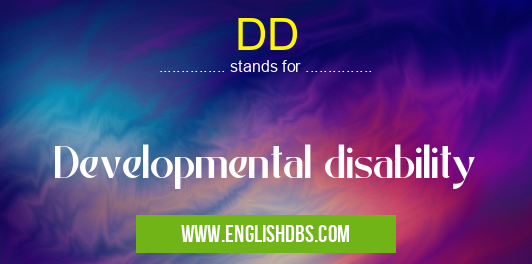What does DD mean in NURSING
DD stands for Developmental Disability and is a term used to describe a wide range of disabilities that can occur due to a variety of causes. People with DD have difficulty performing certain activities of daily living, such as communicating, learning, and self-care. They may also have physical or medical conditions that affect their ability to function independently. These disabilities can result from genetic factors, environmental exposures, or medical problems during prenatal development. DD can affect people of all backgrounds - children and adults; male and female; rich or poor.

DD meaning in Nursing in Medical
DD mostly used in an acronym Nursing in Category Medical that means Developmental disability
Shorthand: DD,
Full Form: Developmental disability
For more information of "Developmental disability", see the section below.
Causes of Developmental Disabilities
The exact cause of most developmental disabilities remains unknown; however some are known to be caused by genetics while others are linked to other health risks such as infections during pregnancy or being born prematurely. Other environmental exposures such as toxins have also been linked to developmental disabilities – including lead poisoning which has been linked to a decrease in IQ scores in exposed individuals. Additionally, maternal low education level has been associated with an increased risk for mild neurological impairments.
Diagnosis
Diagnosis of DD usually begins with an evaluation by a professional who specializes in this area such as a psychologist or psychiatrist. During this evaluation they will assess the person’s current level of functioning in different areas related to this disability including intelligence tests and academic achievement tests. The assessment results will help diagnose the specific type(s) of DD present so that appropriate treatment plans can be developed.
Treatment
Treatment options for people with DD vary depending on the individual’s needs but typically include specialized educational interventions, psychotherapy/behavioral therapies and medication management if necessary. These treatments focus on improving the individual’s functioning in areas where they struggle most – whether that’s communication skills or task completion abilities – and helping them reach their full potential.
Essential Questions and Answers on Developmental disability in "MEDICAL»NURSING"
What is a developmental disability?
Developmental disabilities are a group of conditions due to an impairment in physical, learning, communication, or behavior areas. These conditions begin during the developmental period and usually last throughout a person’s lifetime.
What causes developmental disabilities?
There are various factors that can contribute to the development of a disability such as genetic or chromosomal disorders, medical problems, exposure to toxins or viruses while in utero, and/or complications during birth.
Can people with developmental disabilities live independent lives?
Yes! With proper support services and access to opportunities in the community, people with disabilities can be successful in living independent lives.
Is there a cure for developmental disabilities?
Unfortunately, there is no single “cure” for developmental disabilities as each person has unique needs specific to their diagnosis and circumstances. However, with supports and services many individuals can make improvements in reaching their goals.
Are there treatments available for people with developmental disabilities?
Yes. Treatments depend on individual need but can include behavior therapies focused on specific skills; physical therapy; speech therapy; occupational therapy; educational interventions such as special education services; medications; peer supports; advocacy services; vocational training and job skills development; social skills coaching; assistive technology devices; etc.
Do all states provide supports and services for individuals with developmental disabilities?
Each state has different policies but most states offer some type of public funding through Medicaid Waivers that provides targeted services based on individual need.
How do I know if my child needs additional supports beyond what my school provides for them?
It is best to contact your child’s school district personnel to review your child’s progress relative to their peers. If it appears they need additional assistance beyond what is provided by their school district you may want to consider seeking out an evaluation by professionals outside the school system trained in identifying learning challenges associated with autism spectrum disorder or other potential conditions.
Final Words:
Developmental disability is a condition that affects millions of people worldwide - from children to adults; from every culture and background - yet it still remains largely misunderstood today. Early diagnosis is key for optimizing treatment outcomes so understanding what it means when someone has DD is important for providing them with the best possible support system available. With proper access to resources those affected by DD can lead successful lives filled with purpose despite any challenges they may face.
DD also stands for: |
|
| All stands for DD |
